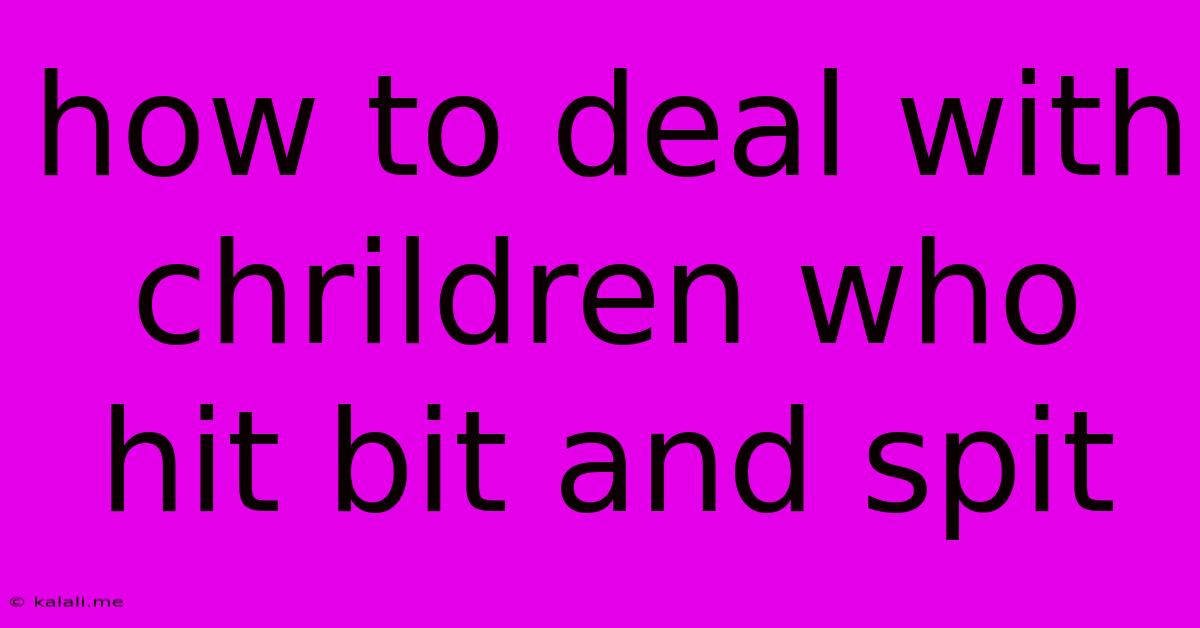How To Deal With Chrildren Who Hit Bit And Spit
Kalali
Jun 05, 2025 · 3 min read

Table of Contents
How to Deal with Children Who Hit, Bite, and Spit: A Guide for Parents and Caregivers
Aggression in young children, manifested through hitting, biting, and spitting, is a common concern for parents and caregivers. This behavior can be frustrating and upsetting, but understanding the underlying reasons and implementing effective strategies can help manage and ultimately reduce these challenging behaviors. This article provides practical guidance and helpful tips on how to address this issue constructively.
Why Do Children Hit, Bite, and Spit?
Before diving into solutions, it's crucial to understand why a child might resort to these aggressive actions. Several factors contribute:
- Limited Communication Skills: Young children often lack the vocabulary to express their needs, frustrations, or emotions effectively. Hitting, biting, and spitting can become their way of communicating anger, fear, or even excitement.
- Developmental Stage: Toddlers and preschoolers are still developing emotional regulation skills. They may struggle to control their impulses and react aggressively when overwhelmed.
- Attention-Seeking Behavior: Sometimes, aggression, however undesirable, can be a way for a child to gain attention, even negative attention.
- Modeling Behavior: Children learn by observing those around them. If they witness aggressive behavior at home or in their environment, they might mimic it.
- Underlying Medical Conditions: In some cases, underlying medical conditions, such as autism spectrum disorder or sensory processing difficulties, can contribute to aggressive behaviors.
Effective Strategies for Managing Aggressive Behavior:
Addressing hitting, biting, and spitting requires a multi-faceted approach focusing on prevention, redirection, and consequence management:
1. Prevention: Setting the Stage for Positive Behavior
- Create a Safe and Predictable Environment: A consistent routine and clear expectations can reduce frustration and anxiety, making aggressive outbursts less likely.
- Teach Emotional Regulation Skills: Help your child identify and label their feelings. Use simple language and modeling to teach coping mechanisms like deep breathing or taking a break.
- Provide Sufficient Stimulation and Downtime: Ensure your child gets adequate playtime, rest, and opportunities for quiet activities to prevent overstimulation.
- Supervise Closely: Constant supervision, especially during potentially stressful situations like playtime with other children, can help prevent aggressive incidents.
2. Redirection: Guiding Your Child Towards Positive Alternatives
- Distraction: When you see your child getting agitated, try diverting their attention with a toy, a game, or another engaging activity.
- Offer Alternative Behaviors: Teach your child alternative ways to express their feelings, such as using words ("I'm angry!"), using a calming object, or seeking comfort from a caregiver.
- Positive Reinforcement: Reward positive behaviors with praise and attention. Focus on celebrating calm and cooperative behavior rather than solely punishing aggression.
3. Consequence Management: Addressing Aggressive Acts
- Immediate and Consistent Response: Respond calmly but firmly to aggressive behavior. Clearly state that hitting, biting, and spitting are unacceptable.
- Time-Outs: A brief time-out can provide a child with a chance to calm down and reflect on their behavior.
- Loss of Privileges: Removing a favorite toy or activity for a short period can be an effective consequence, but ensure it's age-appropriate and consistent.
- Avoid Physical Punishment: Physical punishment is ineffective and can be harmful. It teaches aggression as a way to solve problems.
4. Seeking Professional Help: When to Consult a Specialist
If aggressive behaviors persist despite your efforts, or if they are severe or accompanied by other concerning symptoms, consult a pediatrician or child psychologist. They can help identify underlying causes and recommend appropriate interventions. This is particularly important if the child is exhibiting extreme aggression, self-harm, or other worrying behaviors.
Important Considerations:
- Patience and Consistency: Changing behavior takes time and effort. Remain patient and consistent with your approach.
- Self-Care: Dealing with a child's aggression can be emotionally draining. Make sure you prioritize your own well-being and seek support when needed.
- Positive Language: Focus on what you want your child to do rather than solely focusing on what they shouldn't do.
By understanding the underlying causes of aggression, implementing preventative measures, redirecting negative behaviors, and using appropriate consequence management techniques, you can help your child learn to express themselves constructively and develop healthy social skills. Remember, consistency and patience are key to success.
Latest Posts
Latest Posts
-
How To Use King James Version Bible In Your Copyright
Jun 06, 2025
-
Points That Lie On The Same Plane
Jun 06, 2025
-
Energy Budget Equation With Navier Stokes
Jun 06, 2025
-
Did Luke Try To Kill Himself In Empire Strikes Back
Jun 06, 2025
-
Side By Side Fridge Freezer Not Working
Jun 06, 2025
Related Post
Thank you for visiting our website which covers about How To Deal With Chrildren Who Hit Bit And Spit . We hope the information provided has been useful to you. Feel free to contact us if you have any questions or need further assistance. See you next time and don't miss to bookmark.